

How to Get the Most Out of Studying: Part 1 of 5, "Beliefs That Make You Fail... Or Succeed" How to Get the Most Out of Studying: Part 1 of 5, "Beliefs That Make You Fail... Or Succeed"
Time Management. Goal setting. Student Success study guides » Otago Polytechnic. Study skills. Study skills or study strategies are approaches applied to learning.
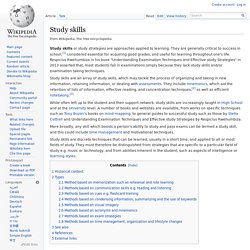
They are generally critical to success in school,[1] considered essential for acquiring good grades, and useful for learning throughout one's life. Respicius Rwehumbiza in his book "Understanding Examination Techniques and Effective study Strategies" in 2013 asserted that, most students fail in examinations simply because they lack study skills and/or examination taking techniques. Study skills are an array of study skills, which may tackle the process of organizing and taking in new information, retaining information, or dealing with assessments. They include mnemonics, which aid the retention of lists of information, effective reading, and concentration techniques,[2] as well as efficient notetaking.[3] While often left up to the student and their support network, study skills are increasingly taught in High School and at the University level.
Historical context[edit] Types[edit] BBC Learning English - Go The Distance: Study Skills. Scott Brueckner's Study Skills Workshops. Cal Newport.
10 Tips for Writing Multiple Choice Exam Questions. Tests don’t create themselves — faculty spend hours writing exams each year.
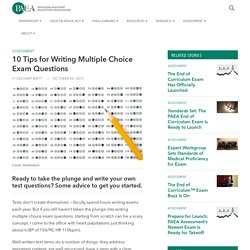
But if you still haven’t taken the plunge into writing multiple choice exam questions, starting from scratch can be a scary concept. I come to the office with heart palpitations just thinking about it (BP of 150/90, HR 110bpm). Well-written test items do a number of things: they address important content, are well structured, have a stem with a clear question, and contain a set of good answer options.
Putting together a question that has these elements isn’t that difficult. Stick to the following 10 tips and you’ll be well on your way to writing effective exam questions. 1. A one-best-answer test question always has three major components: * Stem A five-year-old boy is brought to the office by his father who reports a two-day history of low grade fever and coryza. . * Lead-in question Which of the following is the most likely diagnosis? * List of answer options – Remember these three elements, and you’ll be golden.
Strategies for giving more effective presentations. How to Study for a Test, Exam, or Quiz.
BBC Learning English - Go The Distance homepage. Exam Skills. Learning Strategies. Simple Book Production. A Different Road To College: A Guide For Transitioning To College For Non-traditional Students. Inclusive Learning. Online Resources - Western Piedmont Community College. Math AAA Math Unlimited practice on a comprehensive set of interactive arithmetic lessons.
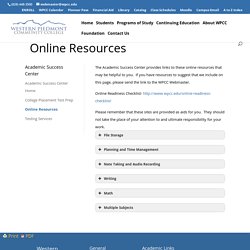
Algebra Homework Help — People’s Math Algebra, math homework solvers, lessons, and free tutors online. Study Guides — Josh Waitzkin. Academic Success Center. Feeling challenged by test preparation?
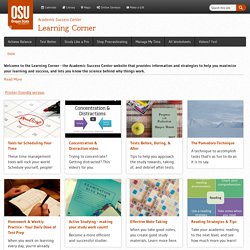
We've got strategies for that. Not sure what to do when your instructor talks fast? We can help. Need a tool to get a better sense for your term and how big assignments coincide with each other, with other exams, with social engagements? Here's one. And, while we know it's great to be able to do the investigation on your own, know that we have trained Academic Coaches who are ready to meet with you and talk through any of this information, or what you're experiencing in your courses.
Barbara Oakley: "Learning How to Learn" Humanities and Social Sciences - Social Cognition. Using Pattern Recognition to Enhance Memory and Creativity - Maria Popova. "If seven friends in turn rapidly told him their phone numbers, he could calmly wait until the last digit was spoken and then, from memory, key all seven friends' numbers into his phone's contact list without error.
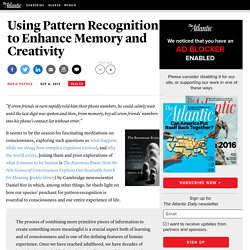
" It seems to be the season for fascinating meditations on consciousness, exploring such questions as what happens while we sleep, how complex cognition evolved, and why the world exists. Joining them and prior explorations of what it means to be human is The Ravenous Brain: How the New Science of Consciousness Explains Our Insatiable Search for Meaning (public library) by Cambridge neuroscientist Daniel Bor in which, among other things, he sheds light on how our species' penchant for pattern-recognition is essential to consciousness and our entire experience of life.
Humanities and Social Sciences - Social Cognition. OpenStax CNX. Information processing model: Sensory, working, and long term memory. Test Taking. Upload TheProjectKnowledge Loading...

Working... ► Play all Test Taking 2 videos195 viewsLast updated on Aug 12, 2013 Play all. Study Guide. Upload TheProjectKnowledge Loading...
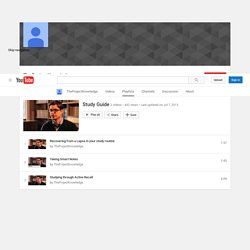
Studying through Active Recall.
Chunking (psychology) A modality effect is present in chunking.
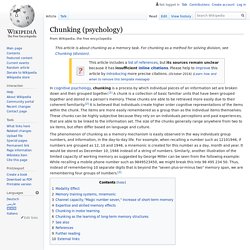
That is, the mechanism used to convey the list of items to the individual affects how much "chunking" occurs. Various kinds of memory training systems and mnemonics include training and drill in specially-designed recoding or chunking schemes. Such systems existed before Miller's paper, but there was no convenient term to describe the general strategy or substantive and reliable research. The term "chunking" is now often used in reference to these systems. As an illustration, patients with Alzheimer's disease typically experience working memory deficits; chunking is an effective method to improve patients' verbal working memory performance (Huntley, Bor, Hampshire, Owen, & Howard, 2011). The word chunking comes from a famous 1956 paper by George A. It is a little dramatic to watch a person get 40 binary digits in a row and then repeat them back without error. Baddeley, A. How stress affects your brain - Madhumita Murgia.
To learn about some of the most seminal experiments that show how stress changes your brain, read this interesting story in Psychology Today.
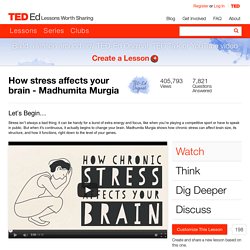
This interactive explains how mom rats impact the adult personalities of their pups, based on how much they lick them.
Academic Reading. Self Regulated Learning & Attention. Critical Thinking.